Californians frightened by talk of an approaching radiation plume from Japan’s nuclear meltdown are making a run on potassium iodide pills, despite scientists’ assurances that the West Coast is in no danger.

The pills, which are being distributed in Japan, fill the thyroid gland with safe, stable iodide and prevent the body from absorbing radioactive iodine. In the U.S., panicked shoppers have been flocking to pharmacies and health food stores like Whole Foods and GNC that normally keep the product in stock. But the shops usually do not carry potassium iodide in large quantities, and many have sold out and now have long waiting lists.
Phone calls to local Whole Foods in Beverly Hills, Santa Monica, and Venice Beach, in Los Angeles, revealed that the stores had been emptied out for days and that supply would not be able to meet demand. One clerk in Beverly Hills, Gaby Flores, said the store has been getting a lot of calls for the supplement. “In the last few days, the majority of calls have been for that,” she said.
An employee at a Santa Monica Whole Foods said the store has been getting “phone calls off the hook for the last week basically asking if we have it,” while another staffer in Venice said his store was sold out but offered to put a caller on a list, though “it’s 12 pages long.”
A spokeswoman for Whole Foods, Libba Letton, said hard numbers were not yet available but added, “I can confirm that we had many customers asking about potassium iodide tablets, and some stores did sell out.”
The idea that dangerous levels of radiation could reach the U.S. is “just incredible,” Forsberg said. “If that was possible, we would have killed everyone with H-bomb tests in the Pacific and Nevada.”
“It’s not a high-volume product, typically, so stores don’t keep a lot in stock—and therefore would sell out more quickly if there were sudden interest,” Letton said. “Our suppliers have indicated they will have more available by the end of this week.”
Shoppers at the GNC in Culver City will not be able to pick up Kelt pure iodide pills, which have sold out, but a cashier said the store does have plenty of multivitamins in stock, which contain the recommended dosage, 150 micrograms of potassium iodide. CVS, meanwhile, carries no radiation-fighting iodide, according to a representative.
That may be just as well. The panic is unnecessary, said Charles Forsberg, executive director of the MIT Nuclear Fuel Cycle Study. The idea that dangerous levels of radiation could reach the U.S. is “just incredible,” he said. “If that was possible, we would have killed everyone with H-bomb tests in the Pacific and Nevada.” In those tests, fissile material was vaporized and shot high into the atmosphere, where some of the nastier isotopes, like strontium and plutonium, could float around. In a reactor meltdown, strontium and plutonium would stay with the core debris while only the more volatile, lighter components would vaporize and float off.
Some of those lighter components, like iodine, are dangerous in high doses, but even in a worst-case scenario they would be so diluted by the time they made it over the Pacific Ocean that they would not pose a threat. David Brenner, director of the Columbia Center for Radiological Research, said even if Fukushima turned into a Chernobyl-scale disaster, the West Coast of the U.S. would be safe. England, a thousand miles from Chernobyl, had no negative health effects from radiation in 1986; the U.S. is several thousand miles from Daiichi. The idea of dangerous levels of radiation from Japan reaching the U.S. is “inconceivable,” he said.
Indeed, radioactive iodine diffuses so quickly in the air that inhalation was not the main danger even for people living near Chernobyl. Contaminated milk posed the biggest peril. For radioactive iodine to pose a health risk, said Forsberg, “You need a mechanism to concentrate it, otherwise it’s very diluted, and cows are really good at concentrating it.” At Chernobyl, iodine fell on the grass, cows ate the grass, and people drank the milk.
The iodine plume itself is not the issue, agreed Brenner, but that it falls on the grass and cows eat it. Brenner said that distributing iodine in Japan is prudent, but probably unecessary. If large amounts of iodine end up being released, it would likely be enough just to tell people not to drink milk for a few weeks, until the iodine, with a half-life of eight days, has time to fade. That is what Soviet officials failed to do as they tried to cover up the Chernobyl meltdown, and why so many people later died of thyroid cancer.
There may even be reason not to take potassium iodide. Though fairly benign, it can have negative side effects for people with thyroid problems, and those who take too much may suffer from nausea, rashes, and inflammation of the salivary gland. Jessica Wehrman, spokeswoman for the American Association of Poison Control Centers, said the group has already tracked seven calls about iodide exposure.
Vuvy Le, a pharmacist at the Manhattan Beach Costco, also urged caution. She has been telling the 20 or so customers a day who have been calling in search of the pills that they should check the California state website for instructions instead. “It’s not a concern right now,” she said. “You don’t take it unless you need it.”
Josh Dzieza is an editorial assistant at The Daily Beast.
Tricia Romano is an award-winning writer who has written about pop culture, style, and celebrity for the New York Times, the Village Voice, Spin, and Radar magazine. She won Best Feature at the Newswomen’s Club of New York Front Page Award for her Village Voice cover story, about sober DJs and promoters in the nightlife industry, " The Sober Bunch."







